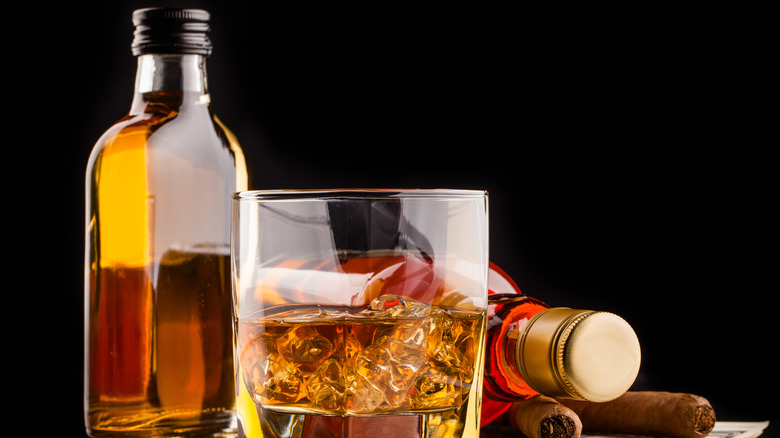Does The Taste Of Alcohol Really Trigger The Release Of Dopamine?
There are a lot of ways to enjoy an alcoholic beverage. Whether you're relaxing by the pool with an icy piña colada or just enjoying a classic cabernet with your steak dinner, the options are endless. Many places also have discounts on drinks that make them extremely hard to pass up, like Trader Joe's "Two-Buck Chuck" deal that lets you purchase wine for just $2 per bottle. For some, even just thinking about these boozy specials can cause a surge of dopamine that makes them more likely to consume a beverage or two or three.
While this firing off of feel-good hormones isn't bad for everyone, it can be extremely problematic for others. A study by the Indiana University School of Medicine looked at how alcohol impacts the brain and the results were surprising, according to Medical News Today. They used positron emission tomography scans on 49 men that first tasted beer and then sampled gatorade. Their research showed that their positive neurotransmitter levels were significantly higher when men chugged down a beer, versus the electrolyte based drink.
Why this liquor study is important to your overall health
Researchers also noted that dopamine levels were much higher among participants that had a history of alcoholism in their family, per Medical News Today. "We believe this is the first experiment in humans to show that the taste of an alcoholic drink alone, without any intoxicating effect from the alcohol, can elicit this dopamine activity in the brain's reward centers," explained Dr. David A. Kareken, professor of neurology at the Indiana University School of Medicine.
If you're concerned you might have an issue with drinking, WebMD reports that there are some early signs you can look out for. If you're consistently having more cocktails than you thought you would after a night out, you could have trouble controlling yourself while under the influence. Another red flag to look out for is if your "usual" amount of alcohol doesn't have the same impact on you anymore and you feel like you constantly need to have more just to get buzzed. If any of these instances sound familiar, there are multiple organizations that can help.
If you or anyone you know is struggling with addiction issues, help is available. Visit the Substance Abuse and Mental Health Services Administration website or contact SAMHSA's National Helpline at 1-800-662-HELP (4357).

